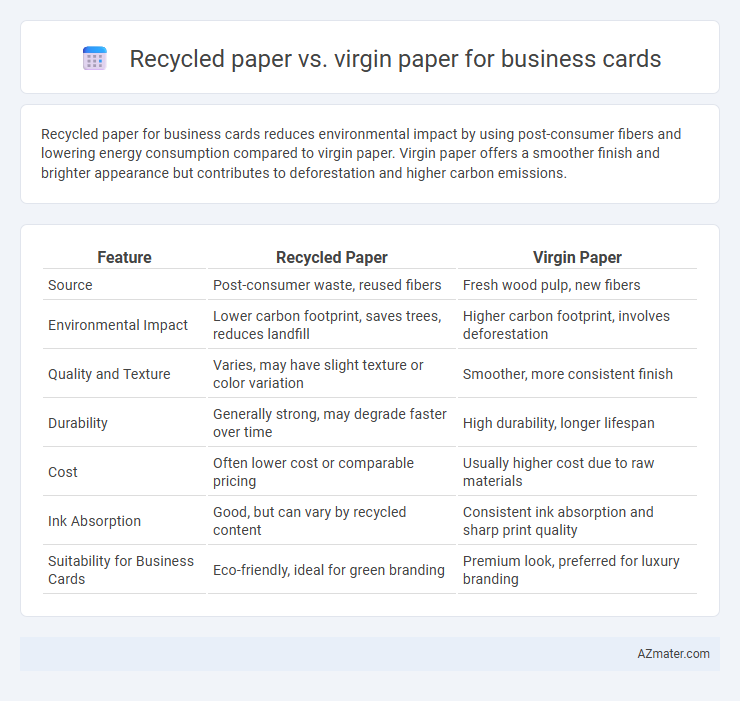Recycled paper for business cards reduces environmental impact by using post-consumer fibers and lowering energy consumption compared to virgin paper. Virgin paper offers a smoother finish and brighter appearance but contributes to deforestation and higher carbon emissions.
Table of Comparison
| Feature | Recycled Paper | Virgin Paper |
|---|---|---|
| Source | Post-consumer waste, reused fibers | Fresh wood pulp, new fibers |
| Environmental Impact | Lower carbon footprint, saves trees, reduces landfill | Higher carbon footprint, involves deforestation |
| Quality and Texture | Varies, may have slight texture or color variation | Smoother, more consistent finish |
| Durability | Generally strong, may degrade faster over time | High durability, longer lifespan |
| Cost | Often lower cost or comparable pricing | Usually higher cost due to raw materials |
| Ink Absorption | Good, but can vary by recycled content | Consistent ink absorption and sharp print quality |
| Suitability for Business Cards | Eco-friendly, ideal for green branding | Premium look, preferred for luxury branding |
Overview: Recycled Paper vs Virgin Paper for Business Cards
Recycled paper for business cards reduces environmental impact by utilizing post-consumer fibers, lowering energy consumption and deforestation compared to virgin paper, which is made from freshly harvested wood pulp and offers a smoother, more consistent texture. Virgin paper typically provides higher durability and a premium feel, making it ideal for businesses seeking a polished, professional appearance. Choosing recycled paper aligns with sustainable branding efforts, appealing to environmentally conscious clients while balancing quality and eco-friendliness.
Environmental Impact: Comparing Sustainability Factors
Recycled paper for business cards significantly reduces deforestation and saves energy by using post-consumer waste instead of raw wood fibers, lowering carbon emissions by up to 60% compared to virgin paper. Virgin paper production consumes more water and involves intensive chemical processes that contribute to pollution and habitat destruction. Choosing recycled paper supports circular economy principles, reduces landfill waste, and promotes sustainable forestry management, making it the environmentally preferable option.
Production Process Differences
Recycled paper for business cards is produced by reprocessing used paper fibers, reducing the demand for virgin wood pulp and energy consumption during manufacturing. Virgin paper involves harvesting fresh wood fibers, which requires more water, energy, and chemical treatments to break down raw materials into pulp. This fundamental difference in production processes makes recycled paper more environmentally friendly by minimizing deforestation and lowering carbon emissions compared to virgin paper.
Cost Analysis: Which is More Economical?
Recycled paper for business cards typically costs 10-20% less than virgin paper due to lower raw material expenses and reduced processing energy. Virgin paper, made from fresh wood pulp, incurs higher costs owing to intensive manufacturing and environmental compliance. Businesses prioritizing budget efficiency often find recycled paper the more economical choice without compromising quality.
Print Quality: Texture and Color Vibrancy
Recycled paper for business cards typically offers a unique, textured surface that can enhance tactile appeal but may slightly dull color vibrancy compared to virgin paper. Virgin paper provides a smoother texture and brighter, more consistent color reproduction, essential for detailed logos and vibrant branding. Choosing between the two depends on balancing environmental values with the desired print quality for professional presentation.
Durability and Longevity of Business Cards
Recycled paper business cards often have lower durability compared to virgin paper due to the shorter fiber length, which can lead to quicker wear and tear. Virgin paper, made from fresh wood pulp, offers higher strength and resilience, ensuring business cards maintain their quality and appearance over an extended period. Choosing virgin paper enhances longevity and professional impression, especially for cards frequently handled or stored.
Corporate Image: Sustainability and Brand Perception
Recycled paper enhances corporate image by demonstrating a commitment to sustainability, appealing to eco-conscious clients and partners. Virgin paper, while often perceived as higher quality, may signal less environmental responsibility, potentially impacting brand perception negatively. Choosing recycled paper aligns with green business practices, reinforcing a positive, forward-thinking brand identity.
Availability and Sourcing Options
Recycled paper for business cards is widely available through specialty suppliers and eco-friendly paper distributors, offering various textures and finishes that cater to sustainable branding needs. Virgin paper sourcing relies on fresh pulp from sustainably managed forests or plantations, often provided by large-scale paper mills with established supply chains. Businesses can choose recycled options for environmentally conscious sourcing, while virgin paper provides consistent quality with a broader range of standard production sources.
Customization and Design Possibilities
Recycled paper for business cards offers a unique texture and eco-friendly appeal, though it may have limitations in color vibrancy and intricate design details compared to virgin paper. Virgin paper provides a smoother finish and greater consistency, allowing for sharper images and more precise customization options, including a wider range of finishes and coatings. Choosing between recycled and virgin paper depends on balancing sustainability goals with the desired level of design complexity and customization.
Which Should You Choose for Your Business Cards?
Recycled paper business cards are eco-friendly, cost-effective, and appeal to environmentally conscious clients, while virgin paper offers superior texture, brightness, and durability for a more premium feel. Choosing between recycled and virgin paper depends on your brand's values and the impression you want to make, with recycled paper emphasizing sustainability and virgin paper highlighting quality. For businesses prioritizing green initiatives, recycled paper is ideal; for those seeking luxury and longevity, virgin paper remains the best choice.

Infographic: Recycled paper vs Virgin paper for Business card
 azmater.com
azmater.com